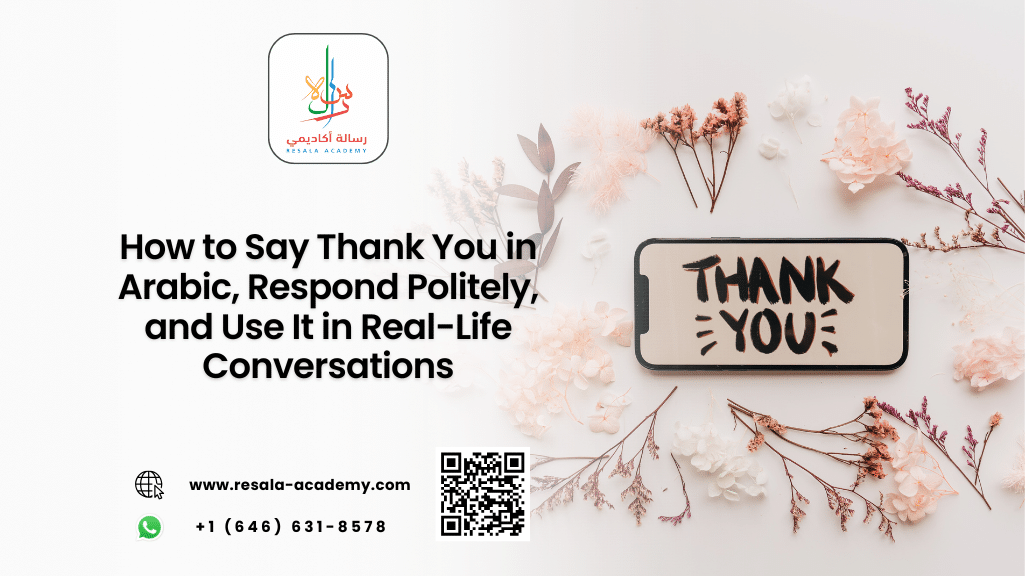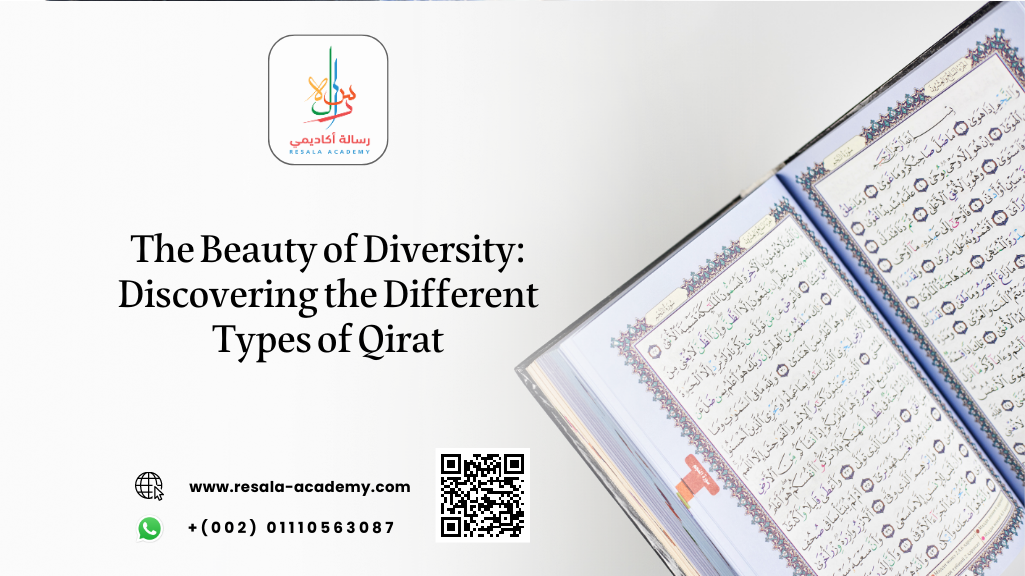Table of Contents
How to Say Thank You in Arabic, Respond Politely, and Use It in Real-Life Conversations
Learning how to express gratitude is one of the most essential aspects of mastering any language. In Arabic, saying “thank you” is not just a polite gesture—it’s a window into a rich culture that values respect, hospitality, and connection.
Whether you’re traveling to an Arabic-speaking country, engaging with Arabic speakers online, or learning the language through a trusted platform like Resala Academy, understanding how to say thank you in Arabic and respond appropriately will elevate your communication skills and cultural awareness.
In this comprehensive guide, we’ll explore:
- The different ways to say thank you in Arabic
- How to respond politely
- Real-life examples and contexts
- Cultural insights
- How to practice and master these expressions with Resala Academy
Let’s dive into the beautiful world of Arabic gratitude expressions!
What Is the Arabic Word for Thank You?
The most common way to say “thank you” in Arabic is:
شكرًا (Shukran)
- Arabic Script: شكرًا
- Pronunciation: /ʃukran/
- English Translation: Thank you
This expression is widely used across the Arabic-speaking world and is suitable for both formal and informal situations. It’s derived from the root word شكر (shukr), which means “gratitude” or “thankfulness.”
Variants and Dialectal Differences
Arabic is a diverse language with many dialects. While شكرًا is universally understood, different regions may use unique expressions. Here are a few examples:
- Egyptian Arabic: شكرًا (Shukran) – same as Modern Standard Arabic (MSA)
- Levantine Arabic: يسلمو (Yislamo) – literally means “may your hands be blessed”
- Gulf Arabic: مشكور (Mashkoor) – commonly used in Gulf countries like the UAE, Kuwait, and Saudi Arabia
Want to learn more about dialects? Resala Academy offers specialized courses in both Modern Standard Arabic and regional dialects such as Shukran meaning.
How to Respond Politely to “Thank You” in Arabic
Just as important as expressing gratitude is knowing how to respond with grace. Here are the most common and polite ways to say “you’re welcome” in Arabic:
1. العفو (Al-‘Afw)
- Arabic Script: العفو
- Pronunciation: /al-ʕafw/
- Meaning: You’re welcome / No problem
This is the most standard and widely accepted response. It can be used in both formal and informal settings.
2. على الرحب والسعة (ʿAla Al-Raḥb wa Al-Saʿa)
- Translation: With pleasure / You’re most welcome
- Usage: More formal and poetic, often used in written Arabic or formal speech.
3. تِكرم (Tikram) or تِكرمي (Tikrami)
- Dialect: Levantine
- Meaning: You’re welcome (male/female)
- Context: Common in Syria, Lebanon, Jordan, and Palestine.
4. حياك الله (Hayyak Allah)
- Translation: May God preserve you
- Context: Common in Gulf countries and often used as a warm, religious response.
Read more about: How to Read Arabic in 30 Days: A Challenge-Based Learning Plan
Real-Life Examples: How to Use “Thank You” in Arabic Conversations
Let’s look at some practical examples to help you understand how to use these expressions in daily interactions.
Example 1: In a Café
Customer: شكرًا على القهوة
Translation: Thank you for the coffee
Response: العفو، صحتين
Translation: You’re welcome, enjoy!
Example 2: Receiving a Gift
You: شكرًا جزيلاً على الهدية
Translation: Thank you very much for the gift
Friend: على الرحب والسعة
Translation: You’re most welcome
Example 3: Online Class with Resala Academy
Student: شكرًا أستاذة على الدرس
Translation: Thank you, teacher, for the lesson
Teacher: العفو، بالتوفيق
Translation: You’re welcome, good luck!
Want to practice these expressions with native teachers? Join Resala Academy and start speaking Arabic confidently!
Cultural Insights: Gratitude in Arab Culture
In Arab culture, expressing gratitude goes beyond words. It reflects deep respect, humility, and appreciation. Here are a few cultural notes to keep in mind:
- Non-verbal cues: A smile, a hand over the chest, or a slight bow of the head often accompanies a thank-you.
- Religious expressions: Phrases like جزاك الله خيرًا (Jazak Allahu Khayran – May God reward you with goodness) are common among Muslims.
- Hospitality: In many Arab countries, guests are often thanked for visiting, even though they are the ones being hosted!
Understanding these nuances will help you connect more deeply with Arabic speakers and show genuine respect for their culture.
Synonyms and Related Expressions of Gratitude in Arabic
To enrich your vocabulary, here are more ways to express thankfulness:
- شكرًا جزيلاً (Shukran Jazeelan) – Thank you very much
- ألف شكر (Alf Shukr) – A thousand thanks
- ممنون لك (Mamnoon Lak) – I’m grateful to you (formal)
- أنا ممتن لك (Ana Mumtan Lak) – I’m thankful to you (male)
- أنا ممتنة لكِ (Ana Mumtanna Laki) – I’m thankful to you (female)
Expand your vocabulary with expert-led lessons at Resala Academy’s Arabic course.
Practice Makes Perfect: How to Master Gratitude Expressions
Here are some effective ways to practice saying thank you in Arabic and responding appropriately:
Join a Structured Course
- Enroll in Resala Academy’s Arabic for Kids
- Learn from native-speaking instructors
- Practice with real-life dialogues
Use Flashcards
- Create flashcards with Arabic expressions and their meanings
- Review them daily
Watch Arabic Media
- Listen to Arabic podcasts, YouTube videos, and TV shows
- Focus on conversations and how gratitude is expressed
Language Exchange
- Partner with a native speaker
- Practice giving and receiving thanks in different contexts
Advanced Contextual Uses of “Thank You” in Arabic Conversations
Understanding the phrase “How to Say Thank You in Arabic” goes beyond memorizing vocabulary—it involves mastering context-specific expressions that reflect both cultural nuance and linguistic precision. Here are advanced scenarios where gratitude is expressed differently depending on tone, relationship, and setting:
Professional Settings: In business or academic environments, learners should use formal expressions like
“أشكرك جزيل الشكر” (Ashkuruka Jazeel Al-Shukr) – “I thank you very much,” which conveys respect and formality.
This is ideal for emails, presentations, or formal speeches.Religious or Spiritual Contexts: When thanking someone for a moral or religious favor, use phrases like
“جزاك الله خيرًا” (Jazak Allahu Khayran) – “May Allah reward you with goodness.”
This expression is deeply rooted in Islamic etiquette and is commonly used by Muslims worldwide.Group Gratitude: When addressing multiple people, say
“شكرًا لكم” (Shukran Lakum) – “Thank you all.”
This plural form is essential when showing appreciation to a group, such as classmates or a team.Expressing Deep Gratitude: For heartfelt thanks, especially after receiving help or support, use
“ممتن لك جدًا” (Mumtannun Laka Jiddan) – “I’m very grateful to you.”
It adds emotional depth and is perfect for personal conversations.
These refined expressions are taught in real-time scenarios at Resala Academy, helping students master both language and cultural etiquette.
Regional Nuances in Saying “Thank You” Across the Arab World
While “How to Say Thank You in Arabic” is a universal query, the answer varies significantly across regions, making it vital for learners to understand localized expressions. Here’s how gratitude is uniquely expressed in different Arabic-speaking areas:
North Africa (Morocco, Algeria, Tunisia): Locals often say “بارك الله فيك” (Barak Allahu Feek) – “May God bless you,” as a way of expressing thanks, especially in religious or familial contexts.
Levant (Lebanon, Syria, Jordan, Palestine): The phrase “يسلمو إيديك” (Yislamo Ideek) – “Bless your hands,” is frequently used after receiving food or a favor, reflecting warmth and appreciation.
Gulf Countries (Saudi Arabia, UAE, Kuwait): Common expressions include “مشكور” (Mashkoor) – “Thanked,” and “الله يعافيك” (Allah Ye’afik) – “May God grant you wellness,” often used interchangeably with “thank you.”
Sudan and Somalia: Gratitude is often expressed with “جزاك الله خير” or localized dialects that blend Arabic with native linguistic influences.
Iraq: Iraqis may say “ممنون” (Mamnoon) – “Grateful,” a Persian-influenced term that’s widely understood and appreciated.
Understanding these regional variations is crucial for real-world fluency. Resala Academy offers specialized dialect courses to help learners adapt their language skills to any Arabic-speaking country.
Why Resala Academy Is Your Gateway to Fluent Arabic?
At Resala Academy, we believe that language is more than vocabulary—it’s a bridge to understanding culture, faith, and human connection. Our online Arabic and Quran classes are designed specifically for non-native speakers, offering:
✅ Certified native Arabic instructors
✅ Live interactive classes
✅ Flexible schedules for all time zones
✅ Courses in Modern Standard Arabic, dialects, and Quranic Arabic
✅ Affordable pricing and trial classes
Whether you’re a complete beginner or looking to refine your skills, Resala Academy provides the tools, support, and community you need to succeed.
Ready to say “Shukran” like a native? Start your Arabic journey today with Resala Academy!
Frequently Asked Questions (FAQs)
1. What is the most common way to say thank you in Arabic?
The most common expression is شكرًا (Shukran), which means “thank you.” It’s used universally across Arabic-speaking countries and is appropriate in both formal and informal settings.
2. How do I respond to “Shukran” in Arabic?
You can respond with العفو (Al-‘Afw), which means “you’re welcome.” Other polite responses include على الرحب والسعة and حياك الله, depending on the context and region.
3. Is “Shukran” used in all Arabic dialects?
Yes, “Shukran” is understood and used in all dialects. However, some regions have their own expressions, such as يسلمو in the Levant or مشكور in the Gulf.
4. Can I use “Shukran” in religious contexts?
While “Shukran” is acceptable, religious expressions like جزاك الله خيرًا (Jazak Allahu Khayran) are often preferred in Islamic contexts, especially when thanking someone for a good deed.
5. How can I practice Arabic gratitude expressions effectively?
Enroll in an online course like those offered by Resala Academy, where you can practice with native speakers, receive personalized feedback, and engage in real-life conversation scenarios.
Conclusion
Learning how to say thank you in Arabic is more than memorizing a phrase—it’s about embracing a culture that values respect, generosity, and heartfelt communication. From the simple “Shukran” to more poetic expressions, each word carries depth and meaning.
By understanding how to express and respond to gratitude, you not only improve your language skills but also build stronger, more meaningful relationships with Arabic speakers.
And the best part? You don’t have to navigate this journey alone. With Resala Academy, you’ll gain access to expert instruction, cultural insights, and a supportive community that empowers you to speak Arabic with confidence and authenticity.
Ready to say “thank you” in Arabic like a native? Let Resala Academy guide your journey.




